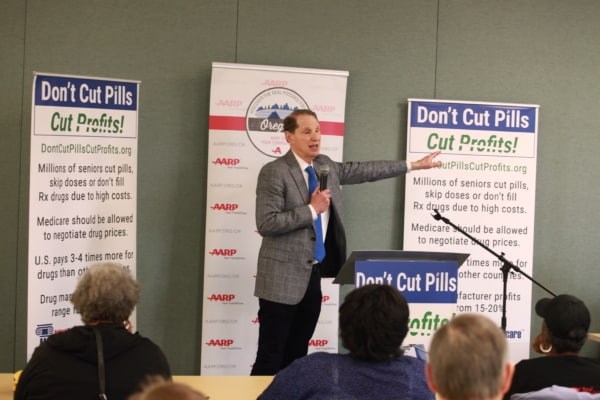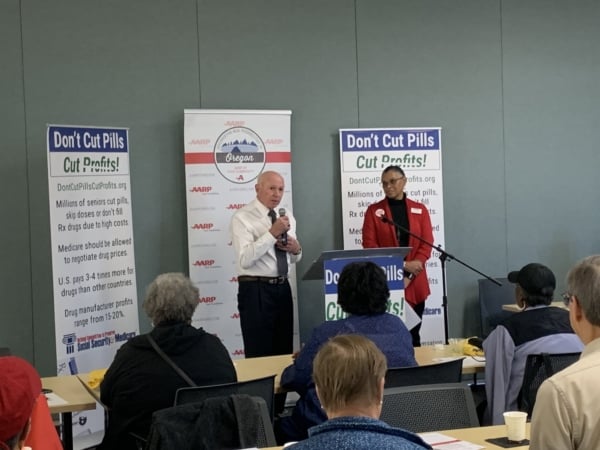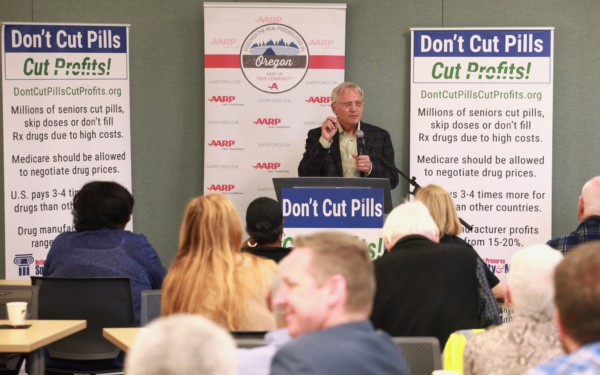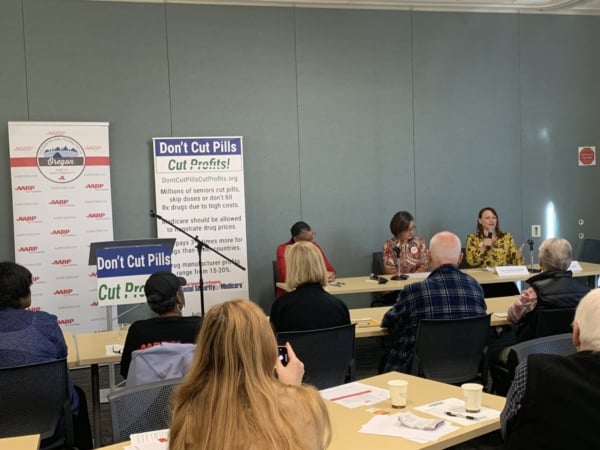
Sen. Ron Wyden at National Committee’s Rx Drug Pricing Town Hall in Portland
Sen. Ron Wyden (D-OR) headlined a spirited town hall on prescription drug pricing Friday in Portland as part of the National Committee’s “Don’t Cut Pills, Cut Profits” campaign. A capacity crowd of local seniors attended the event at Portland Community College, featuring Senator Wyden, Congressman Earl Blumenauer (D-OR), Oregon state reps. Andrea Salinas and Rachel Prusak, and policy experts from the National Committee and AARP Oregon, which cosponsored the event. The town hall was moderated by National Committee president and CEO Max Richtman.
“Drug prices and out-of-pocket costs paid by seniors have soared, forcing some older Americans to go without needed medications, cut pills and skip doses – or even choose between paying for medicine and groceries. Fortunately, the elected leaders at this town hall are working hard to right this wrong.” – Max Richtman, 11/8/19

NCPSSM president Max Richtman moderates Portland town hall on Prescription Drug Pricing
The town hall coincides with intensifying efforts in Congress to pass meaningful drug price reduction legislation. Sen. Wyden, the ranking member on the Senate Finance Committee, co-authored a bipartisan bill that would combat prescription price gouging by Big Pharma. Rep. Blumenauer is a key supporter of legislation in the House (H.R. 3) – backed by Democratic leadership but opposed by Republicans – to allow Medicare to negotiate the price of drugs with pharmaceutical companies (among other provisions).
Sen. Wyden conceded that the House legislation goes further than his bill in the Senate, the Prescription Drug Pricing Reduction Act, which he and Republican Senator Charles Grassley (R-IA) introduced last summer. “It’s not the bill I would have written, folks. But it’s a good start,” Wyden told the town hall audience.
Grassley-Wyden would cap drug prices in Medicare Part D according to consumer inflation levels, slapping penalties on drug makers who fail to comply. Sen. Wyden calls it “the first ever legislated cap on prescription price gouging.” According to the Congressional Budget Office, the bill would save Medicare beneficiaries $27 billion in out-of-pocket drug costs.
The bipartisan Senate bill also imposes a cap on out-of-pocket costs for Medicare Part D patients, which Sen. Wyden called a “peace of mind provision.”
“This ‘peace of mind provision’ means you won’t lose your home over drug prices. We set a cap on the annual amount you pay for prescription drugs, somewhere in the vicinity of $2,000. No one’s going to lose their home because of the price of medicine.” – Sen. Ron Wyden at the National Committee town hall, 10/8/19
Congressman Blumenauer told seniors at the town hall that even if Grassley-Wyden and the House bill do not pass during this session of Congress, they lay down major markers in the fight against Big Pharma price gouging. “We are keeping this issue alive, building momentum, and putting the heat on politicians to be accountable for these policies,” he said.

“Let’s call Big Pharma’s bluff,” says Rep. Earl Blumenauer (D-OR)
Rep. Blumenauer also shot down Big Pharma’s claims that price reductions would harm the research and development of new medicines. The pharmaceutical industry spends billions each year on marketing and advertising that could be put into R&D, much of which is funded by the federal government.
“Let’s call Big Pharma’s bluff: they don’t have to pick the pockets of American consumers in order to have research. We pay the highest prescription drug prices in the world. Half of the prescriptions written are never filled or completely taken… If we’re able to bring the prices down so that people could afford their prescriptions, they’d be in better health.” – Rep. Earl Blumenauer at the National Committee town hall, 10/8/19
According to AARP, the annual average cost of prescription drugs overall increased nearly 60% between 2012-2017, while Oregonians’ income increased only 14.8%. In 2017, nearly one quarter of the state’s residents rationed pills or skipped medications altogether. Oregon seniors who have suffered the consequences of soaring drug prices shared their stories at the Portland town hall.
“Because of the high price of prescription drugs, I am afraid of a lien being placed on our family home.” – Shirley M., Portland, OR
“I chose the provider who charges the least amount of money, and still had to refuse a medication my doctor prescribed because of cost.” – Rose B., Milwaukie, OR
“I am a diabetic and struggle to afford insulin.” – Maryanne W., Aloha, OR
Senator Wyden railed against the skyrocketing cost of insulin during the town hall:
“Insulin is taken by thousands and thousands of Oregonians. The prices have gone up in recent years thirteen-fold and the drug is not 13 times better! It’s basically the same drug as insulin has been for decades. Why does this go on? Because the drug companies can get away with it!” – Sen. Ron Wyden, National Committee town hall, 11/8/19
Oregon lawmakers Salinas and Prusak called the audience’s attention to measures in the legislature to combat rising drug prices on the state level. Last year, Oregon passed a transparency law requiring drug-makers and health insurance companies to report price increases to the state’s Department of Consumer and Business Services.

“It’s ridiculous that people have to ration their prescription drugs.” – Ore. Rep Rachel Prusak (right)
In addition to Senator Wyden, Rep. Blumenauer, and the two state legislators, the town hall featured AARP Oregon Director Ruby Haughton-Pitts, AARP N/NE Portland Chapter President Judy Knawls Boyer, AARP Manager of Federal and State Voter Engagement Khelan Bhatia, and National Committee policy advisor Lisa Swirsky.
“The town hall was an unqualified success,” says National Committee legislative director Dan Adcock. “The audience was engaged and interested. There were good questions and compelling stories. People were glad to hear the latest on prescription drug pricing from key players on Capitol Hill and their own state legislators.”
************************************************************************************************
The National Committee’s Don’t Cut Pills, Cut Profits campaign educates and empowers older Americans to help exert pressure on elected leaders to reduce prescription drug prices. The Portland town hall was preceded by an event in Milwaukee, Wisconsin on October 11th and will be followed by another in Lansing, Michigan on December 9th.


